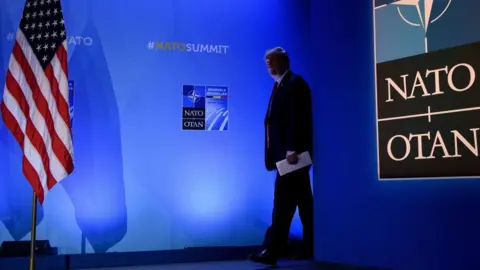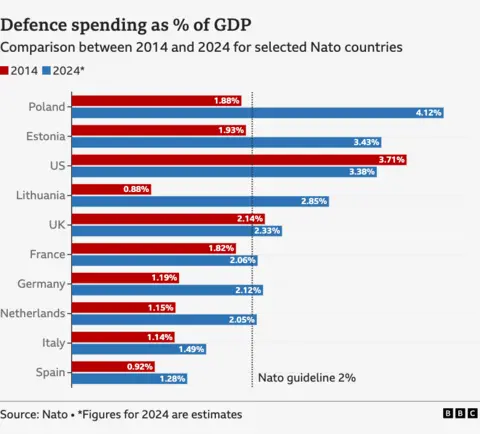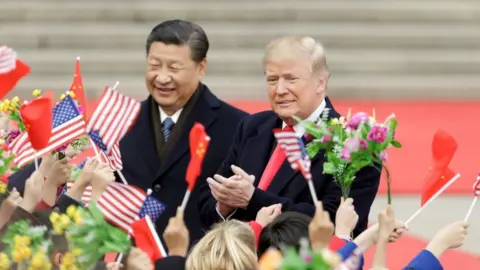Through tom bateman, BBC Environment Branch correspondent
 AFP
AFPThis time only one US president has been at the NATO summit in Washington, but the influence of another – his predecessor – looms over this meeting of the region’s strongest military alliance.
As host Joe Biden delivered a message of solidarity to the group’s 32 participants, the NATO-skeptic approach of Donald Trump, his rival for power, has filled the conversation here with urgency and nervousness.
At times, the smiles of world leaders inside the conference corridors have felt fragile. “Trump monitors every conversation here,” said one Eastern European diplomat, speaking on condition of anonymity.
The Republican’s election as president in November “could change everything”, the diplomat said. The fact that Mr. Biden is trying to prevent a political emergency because of his own weakness has intensified the sense that a second Trump term could be a step too far. -Reshaping an alliance built from the ashes of World War Two and relying on still-weak US military power to demoralize adversaries.
So does NATO want to “Trump-proof” itself – as some describe it – and if so, is this conceivable?
Efforts by NATO allies to reach out to those already in Trump’s political orbit have come as he struggles to control relationships and stave off what they might see as the potential damage of a second term. There is a bundle of evidence. However others suggest something more unbearable.
Camille Elegante, a French former official who was one of NATO’s deputy leaders during the Trump leadership, described herself as “much more concerned” than colleagues, believing that a second term would be “Trump (word) on steroids. could be the one. However, in the long run it works for the alliance.
“He doesn’t have the same kind of guardrails, he doesn’t have the same kind of adults in his room. And he has a team trying to turn his instincts into policy,” said Mr. Elegant, who is now a member of the EU Council on Overseas Family Members.
Four members of the visiting delegation, who spoke on condition of anonymity, told the BBC that their concern was not that the Trump leadership would take away NATO entirely, as he has previously threatened.
This in turn may be a concern given the United States’ adherence to the alliance’s core concept of collective security – “all for one and one for all”, which means that no one is better off under attack. The friend may expect protection from others – may fall short.
Trump’s position on NATO has changed from outright hostility to unequivocally – portraying the alliance as a host of freeloading Europeans who are avoiding coverage paid for by American taxpayers – to suggesting that That their anger is merely part of a cunning negotiating strategy to force NATO’s additional participants to meet. Its defense expenditure objectives.
He has tried to gather a crowd of supporters by regularly attacking the organization. As the summit began, he posted on his Fact Social Network that when he started as President most NATO members were “criminals” until they “paid” because of their power.

By the end of Trump’s presidency, four more NATO countries had opposed the alliance’s guidelines of spending at least 2% of national revenue on defense. So far, 13 other countries have reached the target during President Biden’s tenure.
The move is regularly publicized by the Biden leadership and its supporters, even though in reality most of the increase was caused by Russia’s full-scale invasion of Ukraine.
At a February campaign rally in South Carolina, Trump said he would let Russia do “whatever they want” to NATO countries that don’t spend too much.
This sparked outrage in some quarters in Washington, but privately he said his warnings were too out of date.
At a panel match in January, EU Commissioner Thierry Breton described a meeting in 2020 between Trump and European Commission President Ursula von der Leyen.
“Donald Trump told Ursula: ‘You need to understand that if Europe is attacked, we will never come to help you and support you. And by the way, NATO is dead. And we will be gone. , We will leave NATO.
“He was the president of the United States,” Mr. Bratton recalled. “He may come back.”

The BBC has contacted Trump’s campaign with a request to confirm whether the account was accurate. Evelyn Farkas, a former senior Pentagon official in the Obama administration, believes there remain real concerns over NATO’s survival under Mr Trump.
“I think there is a danger with Trump that he tries to take us out of NATO. I wouldn’t stress it,” said Dr. Farkas, now executive director of the community policy think tank at the McCain Institute.
“The reality is that Trump is dangerous to the alliance because the United States is still the strongest economic, political, military power and NATO is stronger if the United States is in the alliance.”
But Dan Caldwell of the right-wing think tank Defense Priorities, one of the people familiar with Trump’s political thinking, believes the former president’s priority is to push European countries to invest more in their militaries.
“I don’t think he wants to withdraw from NATO, but he has said that the United States should reevaluate its role and the purpose of NATO going forward,” she said.
“Not only the former president but more and more national security experts believe that the United States really has no choice but to do less in Europe. “So I think there are some big forces at work that will ultimately force the next president, whoever it is … to withdraw substantially from NATO.”
The most detailed account of the policy positions affecting Trump’s second term comes from an initiative being raised by Trump’s supporters and opponents alike. Overseen by the conservative Heritage Foundation, “Project 2025” is a thought-provoking 900-page blueprint for a Republican president to initiate sweeping changes at the department.
 getty photographs
getty photographsThe initiative states that a once-in-a-generation president must “transform NATO” to position the US fundamentally for its nuclear deterrent, while giving alternative participants the “vast majority” of standard forces needed to deter Russia. must stop.
This is consistent with the foreign policy position of the issue, seeing China as the first ultimatum to US primacy and therefore calling on the President to “bring about a solution to the foreign policy tensions” arising from Russia’s 2022 invasion of Ukraine.
Trump himself has balked at the war, but has said he would end it in “24 hours.” He supports brokering trade between Russia and Ukraine on terms that many NATO allies would view as a capitulation to Kiev.
Trump has partially rejected Project 2025, saying he does not know who is behind it, but that several of his former officials had a hand in writing it, including a former acting defense secretary.
Since Trump left office, an increase in the choice of NATO members spending at least 2% of their source of revenue on defense has better preserved the alliance for a generation, said Senator Chris Coons, a Democrat who holds the Senate. Sit in overseas, said. Family committee member.
Asked about “Trump-proofing”, he said Congress had also taken steps to protect America’s NATO club from the whims of the White House, in the closing ceremony passing legislation. “We made clear that no president can unilaterally withdraw from NATO without the approval of the Senate,” Mr Coons told the BBC.

Extra on United States Elections

He also highlighted the $60 billion military aid package for Ukraine, passed in a bipartisan battle in April after a nine-month standoff, after Trump’s allies blocked the bill’s passage through Congress.
“It is my hope that if we make, I think, the tragic mistake of moving forward with a second term of Trump, that we will continue to be a counterweight and a counterbalance to the president.”
But Trump has repeatedly challenged current levels of US military provision for Ukraine, and again argued that he could negotiate an end to the war with Russia.
Another possible effort to secure future US support for Ukraine is to establish greater coordination of arms supplies to NATO – taking it out of the reach of a future US president. Such a move has been mooted by NATO Secretary General Jens Stoltenberg as a way to “protect” Ukraine’s backup supplies against the winds of political change, officials told The Financial Times.
At the summit the alliance agreed to launch a new program that would complement, but not replace, the NATO “Contact Group” of 50 nations that would coordinate arms supplies. Camille Elegante, former NATO legitimist, thinks the summit may have “raised the cost” for President Trump by a generation for reiterating the “message” from NATO, but in the end, she said, Trump-proofing. It was impossible.
“If the US, as the largest shareholder in the alliance, decides to get tough on Ukraine, on the alliance, there is nothing in the (summit agreement) and the previous summit that prevents it from doing that.
“But I think it’s sending an important message to Trump and his team, which is that the Europeans have sidelined when it comes to (increased) spending.”
Czech Foreign Minister Jan Lipavsky reiterated this to me, saying that any future US president who wants to change things at NATO has the power to do so.
The actual act of “Trump-proofing” at this summit instead felt like NATO advocates advocating for the alliance to try to get conservative Americans to change their attitudes. Its most notable moment came when President Zelensky appeared at the Reagan Institute for an onstage conversation with Fox News host Brett Baier.
Mr. Zelensky repeatedly invoked memories of the late Republican President Ronald Reagan and quoted Cold War lines on deterring enemies by working with allies.
Reagan is a favorite reference for Democrats trying to highlight Republican divisions and what they see as Trump’s maverick isolationism. The subtext is this: Reagan will be turning in his grave over Trump’s NATO-skeptic stance. But it is a message that may disappoint the people Mr. Zelensky thinks need to hear it.
Additional reporting from the NATO summit via Bernd Debusmann Jr.
Discover more from news2source
Subscribe to get the latest posts sent to your email.





